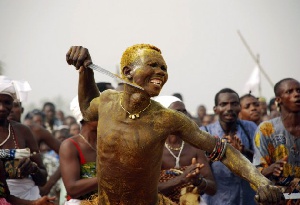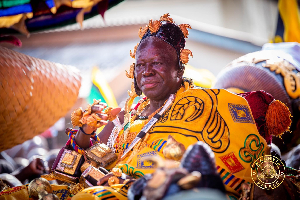Renowned traditionalist Nana Kweku Bonsam has explained that the invasion of social media by voodoo priests is a “hi-tech” response to changes in the times.
There has been a rise in the number of fetish priests on Facebook, Instagram, Twitter and other platforms soliciting clients on the Internet, a departure from the past when practitioners were removed from communities and operated from remote and secluded locations.
But Nana Kweku Bonsam – who disclosed he had two Facebook accounts and was also on Instagram, where he commands 9,000 and 32, 500 followers, respectively – said the phenomenon only reflected a resurgence of African traditional worship, which he said had suffered a decline with the advent of Christianity on the continent some years back.
“It has been necessary to, in the current times, go hi-tech. We do it so people will understand traditional religion. That’s why we’ve erected signboards and billboards. It is not for improper reasons,” the priest told Abena Korantemaa Agyapong on Accra News Thursday April 7, 2016.
He, however, warned that as in other religions, there were charlatans in their midst offering non-existent services on radio, television, the Internet, and on other media to dupe people, a situation he said had made the general public generally distrustful of fetish priests.
He said the failure of such false witch-doctors to deliver on their promises to people who go to them for spiritual assistance had led to such quack priests recruiting bodyguards for their protection, prompting him to ask: “If they have faith in their gods, why do they employ bodyguards? It is simply because they have taken people’s money and failed to render the services they promised.”
Nana Bonsam stated that some persons were also opening spoof social media accounts in his name or simply posing as witchdoctors to defraud unsuspecting persons on social media.
He said their social media presence presents clients living in distant lands the opportunity to be able to interact with them.
‘Voodoo’ (also known separately as Vodun, Voudoun, Vodou, Vaudoux, Vodoun or Voudou), which means ‘spirit’ in the Fon language of the people of Benin – regarded as the birthplace of the faith – is practised in Ghana, Togo, Nigeria, and Benin. It is the main religion among the African Diaspora in the New World, particularly in Haiti, where it offered fortitude to slaves during their hardships and suffering.
It is also prevalent in Puerto Rico, Dominican Republic, Cuba, and Brazil, where it is believed African slaves took the religion along with them.
West African voodoo involves ancestor worship and animism and the belief that the dead are in constant touch with the living.
Voodoo worship usually involves clapping, singing, stomping the ground, and on a few occasions drumming. At the centre of the worship is a god known as Loa.
Voodooists also hold a firm belief in reincarnation, where the deeds of a living person influence where he will live in the next world, though heaven and hell do not exist in the faith.
Religion of Friday, 8 April 2016
Source: classfmonline.com



















